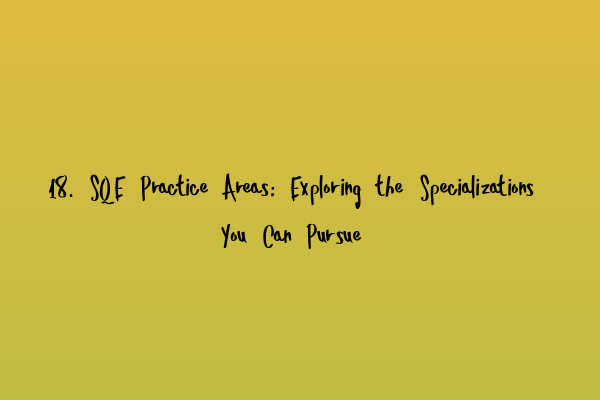18. SQE Practice Areas: Exploring the Specializations You Can Pursue
As you prepare for the Solicitors Qualifying Examination (SQE), it’s important to understand the various practice areas in which you can specialize. The SQE is designed to assess your competence across different areas of legal practice, and by choosing a specialization, you can further enhance your skills and knowledge in a specific field.
By specializing in a specific practice area, you can differentiate yourself from other candidates and demonstrate expertise in a particular field of law. This can be particularly advantageous when seeking employment or pursuing career progression. In this article, we will explore some of the practice areas you can pursue in the SQE and the benefits of specializing in each one.
1. Corporate and Commercial Law
Corporate and commercial law is a popular choice for many aspiring solicitors. This practice area deals with transactions and advisory work involving businesses and commercial enterprises. Specializing in this area allows you to gain a deep understanding of company law, contract negotiation, mergers and acquisitions, intellectual property, and other related legal matters.
When specializing in corporate and commercial law, you’ll be equipped to handle complex legal issues that arise in the business world. You’ll also develop strong drafting, negotiation, and problem-solving skills, which are highly valued by law firms and corporate clients.
To excel in corporate and commercial law, it’s essential to be up to date with the latest developments in business law and have a commercial mindset. Understanding the strategies and dynamics of businesses will be crucial in providing effective legal advice.
If you’re interested in specializing in corporate and commercial law, make sure to check out our related article on SQE Strategies: Proven Tactics to Ace the Solicitors Qualifying Examination for tips and techniques to succeed in this practice area.
2. Criminal Law
Specializing in criminal law allows you to become a legal advocate for accused individuals, both in courtrooms and during police interrogations. As a criminal law specialist, you’ll need to have a comprehensive understanding of criminal procedures, evidence, and the rights of defendants.
Working in criminal law requires excellent analytical and advocacy skills. You’ll be responsible for representing your clients’ best interests and ensuring that their rights are protected throughout the entire legal process.
By specializing in criminal law, you’ll have the opportunity to make a real difference in people’s lives and contribute to the administration of justice.
For more insights on criminal law and how to apply your legal knowledge in real-life scenarios, be sure to read our article on SQE Case Studies: Applying Knowledge in Real-Life Scenarios.
3. Family Law
Family law deals with legal matters related to marriage, divorce, child custody, adoption, and domestic violence, among others. Specializing in family law allows you to provide guidance and support to individuals and families going through challenging personal circumstances.
As a family law practitioner, you’ll need to be empathetic, compassionate, and skilled in conflict resolution. You’ll play a crucial role in helping your clients navigate through emotionally charged situations and achieve fair outcomes.
By specializing in family law, you’ll have the opportunity to make a positive impact on the lives of your clients and contribute to the well-being of families in your community.
4. Real Estate Law
Real estate law encompasses legal matters related to property transactions, including buying, selling, leasing, and development. Specializing in this area allows you to gain expertise in property law, contract drafting, land use, and zoning regulations.
Real estate law is an essential practice area as it plays a significant role in commercial and residential transactions. By specializing in this field, you’ll be equipped to provide advice and representation to clients involved in property-related matters.
If you’re interested in mastering time management strategies for efficient exam completion, you can check out our article on Mastering Time Management in SQE: Strategies for Efficient Exam Completion to help you maximize your study time and excel in the SQE.
5. Employment Law
Specializing in employment law allows you to advise both employers and employees on matters related to employment contracts, discrimination, wrongful termination, and workplace policies. This practice area requires understanding of employment legislation, case law precedents, and dispute resolution procedures.
Employment law specialists play a vital role in protecting the rights of workers and ensuring fair treatment in the workplace. Your expertise in this area can help businesses maintain compliance with employment laws and avoid potential legal issues.
Conclusion
Choosing a specialization in the SQE is an excellent way to further develop your legal skills and expertise, as well as diversify your career options. Whether you’re interested in corporate and commercial law, criminal law, family law, real estate law, employment law, or another practice area, specializing can give you a competitive edge in the legal industry.
To make the most of your SQE preparation and boost your chances of success, be sure to analyze your mock exam results and identify areas for improvement. Our article on Analyzing Mock Results for SQE: Identifying Areas of Improvement provides valuable insights and strategies to help you optimize your study plan.
Remember, the Solicitors Qualifying Examination is your gateway to legal practice. By specializing in a practice area that aligns with your interests and strengths, you’ll be well-positioned to excel in your legal career.
